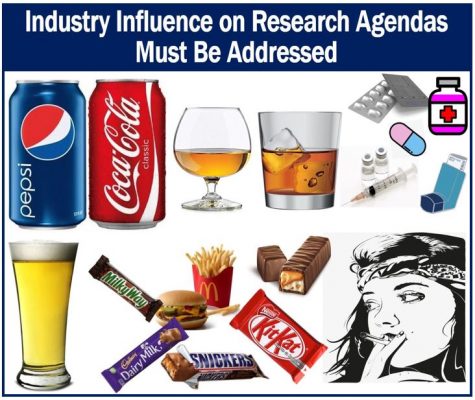We need to address industry influence on research agendas, a new review concludes. A team of researchers from the University of Sydney carried out a review on industry influence on research.
Alice Fabbri, Alexandra Lai, Quinn Grundy, and Lisa Anne Bero wrote about their study in the American Journal of Public Health (citation below). They are all with the Charles Perkins Centre and School of Pharmacy, Faculty of Medicine and Health, University of Sydney. They are also Members of the Evidence, Policy and Influence Collaborative.
Tobacco, food, pharmaceutical, and mining companies are famous for influencing research agendas. Chemical and alcoholic drinks companies also influence research. Typically, they drive questions away from the most relevant issues in public health.
The researchers carried out a scoping review of current original research. The review includes studies that addressed industry influence on research agendas across different sectors.
Industry influence similar across different sectors
Nineteen of the thirty-six articles identified demonstrated industry influence. Specifically, prioritizing lines of inquiry that focused on processes and products that companies could commercialize and market. They also focused on activities that they could commercialize and market.
Lead author, Dr. Fabbri, a postdoctoral research fellow, said this was common for many different fields. The articles also had similar outcomes.

Dr. Fabbri said:
“The medical industry tends to fund research on products with the potential to generate high incomes such as drugs and devices. Meanwhile food industry-sponsored research typically focuses on single nutrients rather than dietary patterns, allowing companies to market manufactured products containing certain nutrients as beneficial to health.”
“Neither are necessarily in the best interests of individuals or society, and potentially limits the scope of public health policies derived from this research.”
Reshaping entire fields of research
The researchers identified also seven studies that analysed internal industry documents. These studies showed the strategies that the alcohol, tobacco, mining and sugar industries used to reshape entire fields of research, said Dr Fabbri.
Regarding key strategies that industries use, Dr. Fabbri said:
“Key strategies include establishing research agendas that support industry policy positions and protect industry from litigation, as well as disseminating industry research agendas by engaging non-industry stakeholders through conferences, committees, and other joint initiatives.”
Industry influence on research through funding
The review includes also ten additional studies that explored the researchers’ experiences and perceptions of the influence of industry funding on research agendas.
Regarding how funding influenced research agendas, Dr. Fabbri said:
“Receiving funding from industry was associated with a tendency to shift research agendas towards more applied research with commercial application.”
“However, there were mixed views on the role industry should play in shaping research agendas, which tended to be aligned with the acceptance of industry funding or not.”
Funding profit-focused research
Regarding industry influence on research agendas, these findings are in line with two recent papers. The recent papers examined Coca-Cola’s influence on the nutrition research agenda.
A review of research that food companies funded identified a worrying lack of transparency. Only Coca-Cola and the Mars Center for Cocoa Health Science provided sufficient detail for analysis.
Along with a focus on single nutrient-specific study questions, more than 40% focused on physical activity.
In a blog about their paper which was published in Public Health Nutrition, the authors wrote:
“This confirms previous findings from investigative journalism that exposed Coca-Cola’s attempt to shift attention from the role of sugar-sweetened beverages in obesity to the role of sedentary behavior.”
A Spanish study
In an article in the European Journal of Public Health, researchers describe a similar problem. They gathered and analyzed data from research in Spain that Coca-Cola had funded.
The study served the company’s commercial objectives, which was at odds with efforts to improve public health, they found.
Co-author in the Spanish study, Juan Pablo Rey-López, said:
“We believe the lessons learned in Spain may be relevant and instructive for countries such as Australia, which also has not implemented a sugar tax despite recommendations from the World Health Organisation.”
Dr. Rey-López is a Postdoctoral Research Associate at the University of Sydney’s School of Public Health.
Prof. Bero said the findings demonstrated the need to address industry influence on research agendas. We need effective strategies to appraise and limit industry influence, i.e., commercial biases, in the research agenda.
Prof. Bero said:
“While it is self-evident industries will fund research on their own products or to support their own positions, these are not always aligned with public health. Disclosure policies must be expanded to increase transparency about the role industry plays in shaping research questions or promoting some research questions and discouraging others.”
“Increased funding for independent research would also counteract corporate influence, as would stricter guidelines regulating interaction with commercial entities.”
“Individual researchers could also learn to recognize when genuine commitments to advance research are being hijacked by industry agendas and avoid participating in such initiatives.”
Citation
“The Influence of Industry Sponsorship on the Research Agenda: A Scoping Review,” Alice Fabbri MD, PhD, Alexandra Lai BPharm, Quinn Grundy RN, PhD, and Lisa Anne Bero PhD. American Journal of Public Health (AJPH). Accepted: July 06, 2018. Published Online: September 25, 2018. DOI: 10.2105/AJPH.2018.304677. PMID: 30252531.

